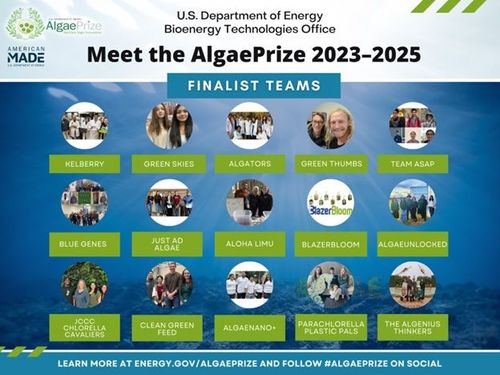DOE announces the 15 finalist teams for AlgaePrize 2023–2025

SOURCE: U.S. Department of Energy
February 15, 2024
BY U.S. Department of Energy
Congratulations to the 15 teams advancing as finalists in the U.S. Department of Energy Bioenergy Technologies Office (BETO) AlgaePrize 2023–2025 competition! The teams, which include students from high schools, community colleges, and universities from 11 states across the United States and Puerto Rico, will each receive $10,000 in funding to support their research projects over the next 16 months. "The AlgaePrize has proven to be the nation’s premier algal-based student research competition,” said BETO Director Valerie Sarisky-Reed. “We are excited again this year to see the innovative research ideas from these diverse teams and look forward to learning how their final research conclusions will harness the potential of algae for a cleaner, more sustainable, and more prosperous world.”
Finalists for the second iteration of the AlgaePrize were selected by a panel of judges based on detailed synopses that described each team’s proposed research plan within the AlgaePrize’s areas of interest.
The competition will culminate with teams presenting their projects during the AlgaePrize Competition Weekend, April 11–13, 2025, at the National Renewable Energy Laboratory in Golden, Colorado. Judges will select five teams as the AlgaePrize winners, with each winning team receiving $10,000. From those five, one Grand Champion team will be selected to receive an additional $15,000 prize.
Learn more about the AlgaePrize and the finalist teams.
Advertisement
Advertisement
The AlgaePrize is sponsored by BETO with support from the Algae Foundation and the National Renewable Energy Laboratory. The AlgaePrize is part of the American-Made Challenges, a series of prize competitions designed to incentivize and reenergize American innovation in the energy marketplace.
Advertisement
Advertisement
Related Stories
The USDA significantly increased its estimate for 2025-’26 soybean oil use in biofuel production in its latest World Agricultural Supply and Demand Estimates report, released July 11. The outlook for soybean production was revised down.
U.S. fuel ethanol capacity fell slightly in April, while biodiesel and renewable diesel capacity held steady, according to data released by the U.S. EIA on June 30. Feedstock consumption was down when compared to the previous month.
The U.S. EPA on July 8 hosted virtual public hearing to gather input on the agency’s recently released proposed rule to set 2026 and 2027 RFS RVOs. Members of the biofuel industry were among those to offer testimony during the event.
The USDA’s Risk Management Agency is implementing multiple changes to the Camelina pilot insurance program for the 2026 and succeeding crop years. The changes will expand coverage options and provide greater flexibility for producers.
The USDA’s National Agricultural Statistics Service on June 30 released its annual Acreage report, estimating that 83.4 million acres of soybeans have been planted in the U.S. this year, down 4% when compared to 2024.
Upcoming Events










